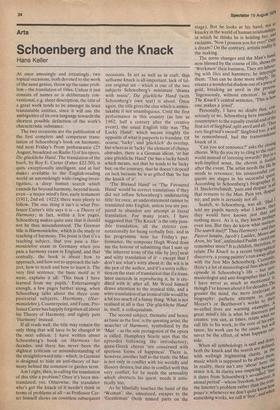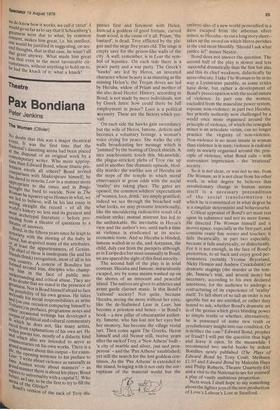Schoenberg and the Knack
Hans Keller
At once amusingly and irritatingly, two topical occasions, both devoted to the work of the same genius, throw up the same problem — the translation of titles. Unless it just consists of names or is deliberately Conventional, e.g. sheer description, the title of a great work tends to be amongst its least translatable entities, since it will use the ambiguities of its own language towards the shortest possible definition of the work's characteristic substance.
The two occasions are the publication of the first complete and competent translation of Schoenberg's book on harmony, and next Friday's Prom performance (25 August, broadcast on Radio 3) of his opera, Die gliickliche Hand. The translation of the book, by Roy E. Carter (Faber £22.50), is quite exceptionally intelligent, and at last make available to the English-reading world an astonishingly wide-ranging investigation, a deep human search which extends far beyond harmony, beyond music even — a major mind's first, early testament (1911, 2nd ed. 1922); there were plenty to follow. The one thing it isn't is what Professor Carter's title says it is — a Theory of Harmony; in fact, within a few pages, Schoenberg makes quite sure that it should not be thus misunderstood. The German title is Harmonielehre, which is the study or teaching of harmony. The point is that it's a teaching subject, that you pass a Harmonielehre exam in Germany when you pass a harmony exam in England, and that centrally, the book is about how to approach, and how not to approach the subject, how to teach and how to learn it. The very first sentence, the basic motif as it were, explains it all: 'This book I have learned from my pupils.' Entertainingly enough, a few pages further along, when Schoenberg talks about the three cornpositorial subjects, Harmony, (Harmonielehre), Counterpoint, and Form, Professor Carter has happily forgotten all about his Theory of Harmony, and rightly puts 'Harmony' instead.
If all reads well, the title may remain the only thing that will have to be changed in the next edition: I have written about Schoenberg's book on Harmony for decades, and there has never been the slightest criticism or misunderstanding of the straightforward title —which, in German is designed to hide an anti-theory of harmony behind the common or garden term.
Am I right, then, in calling the translation of this title a problem? Once it's been mistranslated. yes. Otherwise, the translator who's got the knack of it needn't think in terms of problems at all — as Professor Carter himself shows on countless subsequent occasions. In art as well as in craft, that selfsame knack is all-important, lack of talent original sin — which is one of the two subjects Schoenberg's miniature 'drama with music', Die gliickliche Hand (with Schoenberg's own text) is about. Once again, the title gives the clue which is unmistakable if not unambiguous. Until the first performance in this country (as late as 1962, half a century after the creative event), the usual English title was 'The Lucky Hand', which means roughly the opposite of what it purports to translate. Of course, 'lucky', and ‘gliicklich' do overlap, but whereas in 'lucky' the element of chance obtrudes, there is a German idiom, 'er hat eine gliickliche Hand' (he has a lucky hand) which means, not that he tends to be lucky but, on the contrary, that he doesn't depend on luck because he is so gifted that 'he has the knack of it'.
'The Blessed Hand' or 'The Favoured Hand' would be correct translations if they • did not inflate Schoenberg's understating title: for once, an understatement cannot be translated into English, unless you are prepared to abandon any attempt at literal translation. For many years, I have suggested that The Knack' is the only possible translation, all the stricter connotationally for being verbally free, and in his programme note for Friday's performance, the composer Hugh Wood does me the honour of submitting that I sum up 'the inherent irony of the title by [my] neat and witty translation of it' — except that I don't see what's witty about it: the wit is in the pen of the author, and it's a sorry reflection on the state of translation that if a translator succeeds in reproducing it, he is credited with it: after all, Mr Wood himself draws attention to the ironical title, and a witty translation of an ironical title would be a bit too much of a funny thing. What is not realised at all is that 'Die gliickliche Hand' is, itself, a colloquialism.
The second subject, thematic and hence as basic as the first, is the questing artist, the searcher of Harmony, symbolized by the 'Man' — as the sole protagonist of the opera is called. Humphrey Searle says that the episodes following the introductory, quasi-Greek chorus 'are concerned with spurious forms of happiness'. There is, however, another half to the truth: the Man is not only in conflict with his worldly and illusory desires, but also in conflict with this very conflict, for he needs the sensuality which obstructs his quest, needs it artistically too.
As he blissfully touches the hand of the 'Woman', she, unnoticed, escapes to the 'Gentleman' (both mimed parts on the Spectator 19 August 1976 stage). But he looks at his hand, not s° knacky in the world of human relationshiPs, in which he thinks he is holding her, ald exclaims, 'Now I possess you for ever!' 001 a dream? On the contrary, artistic realitY the making. The scene changes and the Man's hatld' now blessed by the course of life, shows the 'Workmen' their business. They are labour' ing with files and hammers; he interraPts them: 'That can be done more simplY: "et creates a wonderful diadem out of a piece °, gold, breaking an anvil in the 'Ingenuously, without emotion', he Ore The Knack's central sentence, 'This is how one makes a jewel'. Personally, I have no doubt that, al' sciously or no, Schoenberg here intended a counterpart to the equally crucial end of the, first act of Siegfried, split anvil and all: cuts Siegfried's sword!' Siegfried too, it be remembered, had the transcendent," knack of it.
no; and pain is certainly not all. d I
you not y do n do rye000 try y n c t renounce?' ? cling' s k s t othe cho'Cruasn.clusingr the outea world instead of listening inwards? Bat ,, well-implied sense, the chorus is foolisPe after the event. The artist needs the lifeh needs to renounce; his unsuccessful e°'i: quests are stages in his successful clueis4. According to Schoenberg's biograPh H. Stuckenschmidt, 'pain and despair' 'dr that remains to the Man. Pain yes, clesP-1 Search, to Schoenberg, was all: 'Ha told my pupils merely what I know, th°d they would have known just that a° s nothing more. As it is, they know Pedlars!). even less. But they do know what matt ; The search itself!' Thus Harmony —au" —kid Pie rrot lunaire, Jacob's Ladder,Mo
an
Aron, his 'last', unfinished Psalm —ueed° to remember more? It is childish, therefore.'eg relate The Knack to a recent biograPholoit discovery, a young painter's run-awaY 3 tlyt with the first Mrs Schoenberg. Current there's a lot of musicological fuss about episode in Schoenberg's life — but Tao, musicologist and anti-biographer that I have never as much as mention The though I've known about it for decades-, its greater the mind, the more irrelevantiate biography: pathetic attempts to retheir Mozart's or Beethoven's works to A so-called lives are warning exatuPles.ahd great mind's life is what he discover% we creates: you can, at times, relate whaeo. call life to his work, to the core of ,his a0wig tance; his work can be the cause, but never be the effect, of what haPPerls dolle' When all symbolology is said and both both the knack and the search are ue.,„ the with wellnigh frightening clarity, ' :therri" music which is supposed to be ahoti the In reality, there isn't any 'about' hebre'cose music is it, its clarityawe-inspiriug, d free it dates from Schoenberg's so-ealie ver, is atonal period' —whose freedom, h°We .,, he co the listener's problem rather than how poser's: whenever we don't quite tui° hen 7 nd w something works, we call it 'free, 3 we do know how it works, we call it 'strict'. I would go so far as to say that if Schoenberg's greatness were due to what, by common Consent, makes him great, i.e. his intellect, one would be justified in suggesting, on second thoughts, that in that case, he wasn't all that great anyway. What made him great was that even in the most favourable circumstances, without anything to hold on to,
had the knack of it: what a knack!



































 Previous page
Previous page